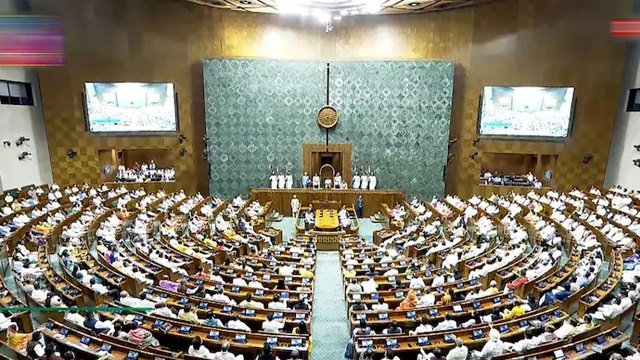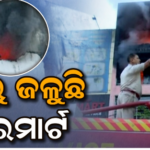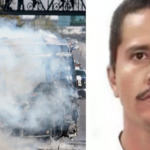‘One Nation, One Election’ bill introduced in Lok Sabha, Opposition demands withdrawal

NEW DELHI, DEC 17 : Union Law Minister Arjun Ram Meghwal on Tuesday introduced two bills, including a constitutional amendment, to implement ‘One Nation, One Election’ (ONOE), a proposal seeking the simultaneous conduct of Lok Sabha and state assembly elections.
Meghwal moved for introduction the Constitution (One Hundred and Twenty-Ninth Amendment) Bill, 2024, popularly being referred to as the Bill on ‘one nation, one election’ and the Union Territories Laws (Amendment) Bill, 2024, which seeks to align the elections of the union territories of Jammu and Kashmir, Puducherry and the NCT of Delhi.
The bills were introduced after the opposition sought a division of votes. After electronic voting and a subsequent count by paper slips, the bills were introduced with 269 members in favour and 198 against.
This was the first time that the electronic voting system was used in the Lok Sabha in the new Parliament House.
The proceedings were later adjourned for a little over an hour till 3 pm.
This paves the way for the BJP’s push for sweeping electoral reform—a core pledge since it came to power in 2014.
However, the proposed legislation received vociferous backlash from Opposition parties, who called for its immediate withdrawal, terming it anti-democratic and a violation of the Constitution’s basic structure.
The legislation received backing from NDA allies, with TDP and Eknath Shinde-led Shiv Sena offering support, while fence-sitters like the BJD said it will decide its stance after examining the details of the two bills.
Objecting to the proposed legislation, Congress MP Manish Tewari called the ONOE bills an assault on the basic structure doctrine of the constitution. He urged the Union government to withdraw the bills, asserting that the introduction and consideration of ONOE were beyond the legislative competence of the House.
“Beyond the seventh schedule of the Constitution is the basic structured doctrine and that basic structure doctrine spells out that there are certain features of the Indian Constitution which are beyond the amending power of this House also… Therefore the bills which have been moved by the Minister of Law and Justice absolutely assault the basic structure of the Constitution and are beyond the legislative competence of this House and therefore they need to be opposed and the introduction of those bills have to be stopped,” Tewari said.
Samajwadi Party MP Dharmendra Yadav also opposed the bills, terming them an attempt by the BJP to “bring in dictatorship” in the country.
“I am standing to oppose the 129th Amendment Act of the Constitution, I am not able to understand just 2 days ago, no stone was left unturned in the glorious tradition of saving the Constitution. Within 2 days, the Constitution Amendment Bill has been brought to an end the basic spirit and the basic structure of the Constitution,” Yadav.
Delivering his party’s objection, Trinamool Congress MP Kalyan Banerjee launched a scathing attack on PM Narendra Modi and termed the bills not as election reform, but “a fulfilment of one gentleman’s desire and dream.”
“This proposed bill hits the basic structure of the Constitution itself and if any bill any actual which hits the basic structure of the Constitution that is ultra vires…We must remember that the State government and the State Legislative assembly are not subordinate to the Central government or to the Parliament itself…Therefore, by this process, the autonomy of the State Legislative Assembly is being taken away,” Banerjee said.
DMK MP TR Baalu also opposed it calling it “anti-federal” and urged the government to refer the bills to a parliamentary committee. Similarly, NCP (SP) leader Supriya Sule urged the government to either withdraw the bill or refer it to the parloament committe. Other opposition leaders of the INDIA bloc, including Shiv Sena (UBT) leader Anil Desai and IUML’s ET Mohammed Basheer, opposed the introduction of the ONOE bills.
IMIM MP Asaduddin Owaisi said the bill will “finish off regional parties” and took aim at Modi, stating the legislation has been brought in to “massage the ego of the supreme leader.”
“I oppose this draconian and unconstitutional bill. This bill indirectly introduces presidential style of democracy, this bill is based on maximizing political gain and convenience. This bill will finish off regional parties. This bill is only brought in to massage the ego of the supreme leader. I oppose the bill,” the AIMIM MP said.
Congress MP Priyanka Gandhi Vadra criticised the bill proposing simultaneous elections, calling it “anti-constitutional” and asserting that it undermines federalism. “Anti-constitutional bill, it is against the federalism of our nation. We are opposing the bill,” Gandhi Vadra told reporters in the Parliament premises.
Speaker Om Birla conducts proceedings in the Lok Sabha during the Winter session of Parliament in New Delhi, Tuesday, Dec. 17, 2024.
Cabinet clears ‘One Nation, One Election’ bill, but political and logistical hurdles remain
Countering the opposition’s charges, Law Minister Meghwal stated that the bills align with the Constitution and do not assault the basic structure doctrine. He claimed that objections to the bills were political in nature and proposed that they be sent to a Joint Parliamentary Committee for wider consultations.
This was also echoed by Union Home Minister Amit Shah who said, “When One Nation, One Election bills came up in Cabinet, PM Modi said this should be referred to Joint Committee of Parliament. There should be a detailed discussion over it at every level.”
The joint panel will be constituted on a pro-rata basis, based on the strength of MPs of various parties. As the largest party, the BJP is expected to get the chairmanship of the committee, besides several members.
Meanwhile, TDP’s Chandra Sekhar Pemmasani supported the bill, saying his party extends unwavering support to the proposal. Shiv Sena member Shrikant Shinde also extended support and claimed that the Opposition had allergy towards reforms.
Notably, the path to passing these legislations is fraught with challenges.
While the bill on Union Territories will require a simple majority in both Houses, the constitutional amendment bill will need support from two-thirds of the members in both the Lok Sabha and Rajya Sabha to pass.
Although BJP allies such as the TDP, Janata Dal (United), and the Lok Janshakti Party (Ram Vilas), all represented in the Union Cabinet, support the proposal, the National Democratic Alliance (NDA) will need backing from members of the opposition INDIA alliance and fence-sitters, including the BRS, BJD and YSRCP.
The NDA’s current strength in the Lok Sabha stands at around 293, short of the two-thirds majority mark of 361, with 542 members and one vacancy. The INDIA alliance holds support from around 235 MPs.
In the Rajya Sabha, the ruling alliance has approximately 122 members, a number expected to rise once the ongoing process to fill vacancies is completed. With a sanctioned strength of 243, a two-thirds majority in the Upper House would require 162 votes.
Speaker Om Birla conducts proceedings in the Lok Sabha during the Winter session of Parliament in New Delhi, Tuesday, Dec. 17, 2024.
Key recommendations in ‘One Nation One Election’ report ‘flawed’: Ex-CEC Quraishi
Simultaneous polls not new to India, says govt
Prior to the introduction of ONOE bills, the goverment released an exlpainer claiming that the concept is not new to the country.
Following the adoption of the Constitution, elections to the Lok Sabha and all state assemblies were conducted simultaneously from 1951 to 1967, it noted.
The government said the first general elections to the Lok Sabha and State Assemblies were held together in 1951-52, a practice that continued for three subsequent general elections in 1957, 1962, and 1967.
“However, this cycle of synchronised elections was disrupted in 1968 and 1969 due to the premature dissolution of some State Legislative Assemblies,” an official explainer said.
The Fourth Lok Sabha was also dissolved prematurely in 1970, with fresh elections held in 1971.
Unlike the first, second, and third Lok Sabha, which completed their full five-year terms, the fifth Lok Sabha’s term was extended until 1977 under Article 352 because of the declaration of Emergency.
Since then, only a few Lok Sabha terms have lasted the full five years, such as the eighth, 10th, 14th and 15th. Others, including the sixth, seventh, ninth, 11th, 12th and 13th, were dissolved early. State assemblies have faced similar disruptions over the years.
Premature dissolutions and term extensions have become a “recurring challenge”, the government said.
“These developments have firmly disrupted the cycle of simultaneous elections, leading to the current pattern of staggered electoral schedules across the country,” it observed.
Citing a report of the high-level committee on ‘one nation, one election’, the explainer said simultaneous polls promote consistency in governance.
“Due to the ongoing cycle of elections in various parts of the country, political parties, their leaders, legislators, and both state and Central governments often focus their efforts on preparing for upcoming elections rather than prioritising governance,” it said, citing the ‘rationale’ for holding simultaneous polls as recommended by the panel headed by former president Ram Nath Kovind.
The adoption of simultaneous elections would refocus the government’s attention towards developmental activities and the implementation of policies aimed at promoting the welfare of the masses, it added.
-PTI





